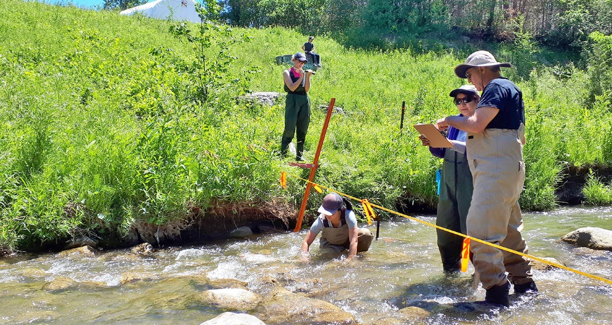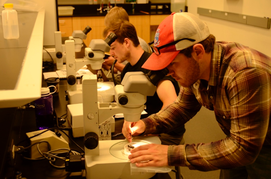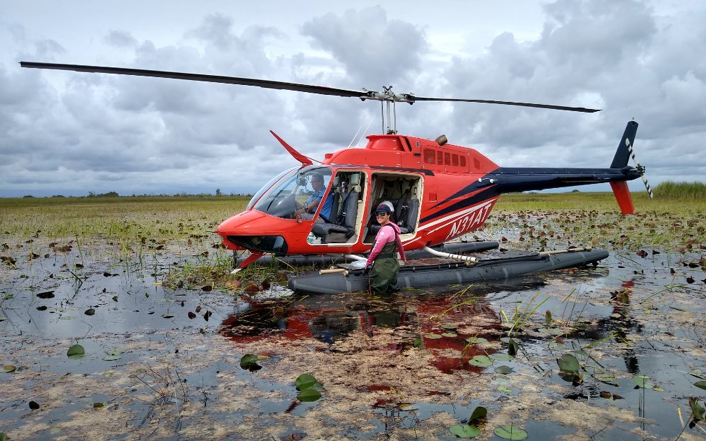|
by Michael Rogers Are you looking to explore a career in ecology? A career in ecology can take you many places but where should you start? Emerging Leaders for Biodiversity (ELB) is a fine place that many of us have relied on to start our exploration. ELB’s blog is full of a number of insights and stories from other early career ecologists to help support those who are trying to get their footing. This post is the first in a series on our blog exploring different ecology roles, how to look for these roles, and what opportunities to target in order to make yourself more competitive for these roles. Before we get ahead of ourselves, it’s important to understand some background context about the sector in order to align our expectations. Working in Ecology is Full of Ups and Downs One of the great joys about ecological work is that there are so many ways to be involved. Each requires a distinct mix of skills, knowledge, and responsibilities. Finding the right role requires self-exploration and perseverance. A love for the outdoors is a key contributor to one's perseverance through the volatility that is being an early career ecologist. Many positions are ephemeral. Even the best of jobs are not always available and those well-suited contracts are likely to end as funding dries up. The truth of the matter is, the ecology sector is highly competitive, and funding to support wages is scarce. A key funder, The Canada Summer Jobs program, works with employers to hire young professionals (under 30 years old) capped by 2, 4 and/or 6 month contract terms. Most young ecologists will find themselves working these short-term contracts as funding for roles becomes available and as seasonal needs change. It commonly takes several years of an ecologist’s career jumping between contracts before landing in a long-term career-defining role. To some, this is a hardship that must be acknowledged before diving headfirst into an ecology-based career. To others, this is an opportunity to explore yourself, obtain a variety of experiences, and build valuable professional connections. What are the Archetypical Roles? Field Technician: This the most commonly sought after ecologist role for entry-level seasonal work. Individuals in these roles must be comfortable working outdoors. These roles tend to focus on specialization in subject-specific matter depending on the project manager’s needs (e.g., fisheries, flora, fauna, habitat-type, etc.). Field technicians have a depth of practical ecological knowledge including species identification, surveying, and data tracking. Laboratory Technician: While most lab technicians do get out in the field, their home is in the lab processing samples and verifying work of other ecologists. Lab technicians usually have more specialized expertise focusing on one domain of interest. Data Analyst: These roles support ongoing project reporting and are predominantly found during the “off-season” (November-March). Data analysts can function well independently and have good problem-solving and computer skills. Policy Analyst: A supporting role of organizational advocacy, constituent engagement, and technical reporting. Roles can require a variety of backgrounds and specialties, but all require focusing on political interactions and outcomes. Policy analysts must be politically well-informed and thorough with their work. Communications: A role that is growing in demand. Focused on expanding ecological outreach programming, writing, and events organization, those in communications benefit from creative thinking to share ecological knowledge with constituents using a variety of mediums. Defining Factors of the Ecology Sector Wearing Multiple Hats Employers often allocate a contract to split time between projects. Take note of postings that ask for a mix of responsibilities. Having a multi-faceted background can be valuable to employers seeking to split your time between managers. It is equally important to balance your skillset portfolio to specialize, too (e.g., identification skills). The Reason for the Seasons Early career ecology contract availability follows the seasons, mirroring ecology itself. Year-round contracts are much rarer and favour those with a few years of experience under their belt. Postings are made year-round, but you will find more roles focused to the lab, data analysis, policy, and communications after the field season. Field-based roles are most commonly hired between February and April for summer contract-based work May-August. You might notice that data analyst and lab technician postings become more popular during the late summer through the winter - someone has to process all the data that the field technicians collected! Communications roles are often posted when organizations are ramping up their outreach communications preparation during the spring and early summer. Expect a rise in communications postings during the winter to start work in the spring and early summer.
This is just the start! Stay tuned in the coming months as various blog writers explore "Where are all of the jobs?" and "How to Build Skills and Experiences that Employers will Value". We will be doing an analysis of real job postings, the qualifications that are required for specific roles, and how you can actively attain these qualifications before your desired job postings open. And as always, if you have specific questions or job postings you would like us to analyze, email us at [email protected]!
5 Comments
|
ELB MembersBlogs are written by ELB members who want to share their stories about Ontario's biodiversity. Archives
January 2023
Categories
All
|





 RSS Feed
RSS Feed